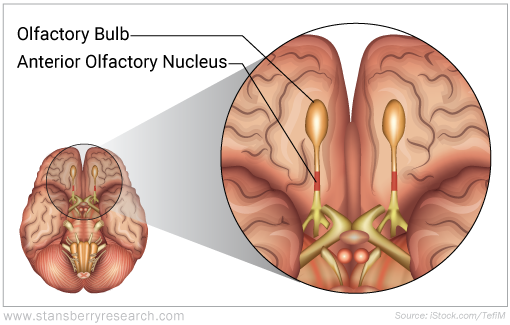Take some time to smell the flowers – and save your memory.
That's according to new research out of the University of Toronto. Researchers discovered a link between smells and memory. The researchers found a connection in mouse brains between the hippocampus and something called the anterior olfactory nucleus (AON).
The hippocampus is the target of a lot of dementia and Alzheimer's studies. That's because it plays a large role in long-term memory storage. It also helps regulate emotions.
But, it turns out, the storage of memories also involves this tiny AON. Take a look at where it sits in our brain:
It's part of the tract that connects the olfactory bulb to the rest of the brain. The olfactory bulbs look like thin fingers that sit close to the nasal passages. They connect to the olfactory nerves, which pick up signals right from the nose.
Even though this is a mouse model, we already know that smell has a powerful tie to memory in humans as well.
The exciting part of the study is this connection between the two brain regions. We now understand just how certain smells connect us directly to certain memories. Think about a particular smell that does this for you – maybe it's the smell of vanilla that takes you back to your grandmother's kitchen, or a certain perfume that reminds you of the first time you met your spouse.
What's more, we already know that decay in the AON appears early in Alzheimer's disease. That's why some doctors might try a "smell test" to see if someone shows symptoms of the memory-stealing illness.
In fact, a study last year in the Journal of the American Geriatrics Society showed that when older folks could not identify at least four out of five odors in a test, they had double the chance of developing dementia within five years.
There's evidence that smells will help improve your memory as well. Scents like lavender and rose can actually boost your memory.
For example, a Japanese study from 2009 followed Alzheimer's patients receiving aromatherapy in the morning and in the evening, including with lavender essential oil. After 28 days of aromatherapy, all of the patients (even the control group without Alzheimer's) scored higher on four different cognitive and dementia-assessment tests.
Longtime readers know of my love of flowers. They remind me of my father, who kept fresh flowers in his lapel for the last 35 years of his life.
[optin_form id="73"]
I've seen how they improve mood and reduce feelings of anxiety and depression. What's more, other studies have shown they can reduce pain levels as well.
Flowers have rooted themselves in our traditions for centuries because of their ability to boost our moods and lower our stress. And with this new information about smell and memory, take time to smell the flowers and boost your brain.
Do what I do and enjoy flowers through gardening at your home like I've done over the years. I recommend planting perennials because they come back year after year – no need to keep planting new flowers every year.
July is a bit too hot for planting in much of the U.S., but it's a good time to think about ordering bulbs for daffodils and lilies – two of my favorites. I've planted hundreds of bulbs and love the increasing dividends I see from my flowers each year.
Flowers are a simple and inexpensive way to boost both your happiness and well-being. Watch your mood, creativity, and brain health improve with just a single flower. And if you have a favorite smell, we'd love to hear about it. Write to us at [email protected].
What We're Reading...
- Something different: How important pitch really is.
Here's to our health, wealth, and a great retirement,
Dr. David Eifrig and the Health & Wealth Bulletin Research Team
July 31, 2018

